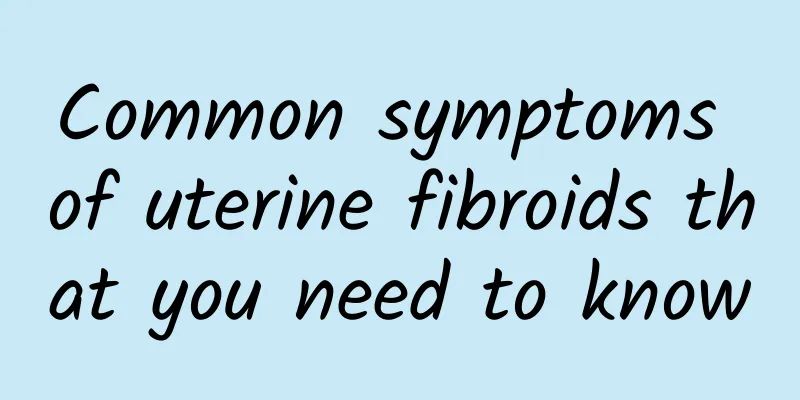Common symptoms of uterine fibroids that you need to know

|
There are always some signs in the early stages of a disease, and the same is true for uterine fibroids. In order to detect symptoms early and treat them in time, we will introduce the symptoms of uterine fibroids below. 1. Menstrual changes: When tumors grow in the uterus, such as uterine fibroids, endometrial cancer, uterine sarcoma, and choriocarcinoma, menstrual abnormalities may occur, including excessive menstrual flow, irregular menstrual cycles, prolonged menstrual duration, and spotting. Certain ovarian tumors, such as granulosa cell tumors and theca cell tumors, can secrete estrogen, interfere with the menstrual cycle, and cause menstrual abnormalities. For example, long-term excessive menstrual flow caused by fibroids can lead to secondary anemia, which in severe cases can manifest as general fatigue, pale complexion, and shortness of breath. Symptoms such as palpitations are common symptoms of uterine fibroids.2. Abdominal pain: Ovarian tumor torsion, rupture or infection, uterine submucosal fibroids prolapse from the cervix or fibroid degeneration can all cause severe lower abdominal pain. 3. Postmenopausal bleeding: In the first year of amenorrhea, vaginal bleeding may occur occasionally. If vaginal bleeding occurs again after more than one year of amenorrhea, it is called postmenopausal bleeding. There are many reasons for postmenopausal bleeding. In most cases, it is caused by benign diseases, but the possibility of cervical cancer and endometrial cancer cannot be ignored. Although the amount of bleeding is sometimes not much, this is also one of the symptoms of uterine fibroids. 4. Tumors: They can grow in any part of the reproductive organs. They are usually discovered by accident. Even if these tumors do not have any symptoms, they are abnormal and are mostly tumors. 5. Changes in diet and urination: The symptoms of uterine fibroids may only include abdominal distension, poor appetite and gastrointestinal symptoms. Tumor compression or invasion of the bladder and rectum can cause frequent urination, difficulty urinating, dry stools, etc. I hope that the above five aspects of the introduction to the symptoms of uterine fibroids will be helpful to everyone. Once any of the above symptoms appear, go to the hospital for examination and diagnosis in time to avoid delaying the disease and affecting treatment. I hope everyone can maintain a healthy body. |
<<: What you need to know about the causes of uterine fibroids
>>: Key points to know about postoperative care for uterine fibroids
Recommend
What medicine can adults take to cure dysmenorrhea quickly?
What medicine can adults take to cure dysmenorrhe...
Female endocrine disorders are the main culprit of vulvar leukoplakia!
As the incidence of vulvar leukoplakia has remain...
What are the medicines for early menstruation?
What are the medicines for early menstruation? As...
How to treat the four stages of endometriosis
The treatment of endometriosis needs to be person...
What are the precautions for preventing Bartholinitis?
At present, the incidence of Bartholinitis is inc...
Who are the people at high risk of ectopic pregnancy?
Who are the high-risk groups for ectopic pregnanc...
How to prevent women from gaining weight after abortion
How can women prevent weight gain after abortion?...
Is surgery necessary for uterine cysts? Are there no other treatments?
Uterine cysts do not necessarily require surgical...
A brief analysis of psychological therapy for the treatment of vulvar leukoplakia
In the process of treating vulvar leukoplakia, in...
Several important nursing points for ectopic pregnancy
Scientific care for ectopic pregnancy is very imp...
How to avoid habitual miscarriage? Pay attention to these 5 aspects
Habitual miscarriage is a nightmare for many wome...
There are reasons why you can't lose weight. Long-term dieting leads to slow metabolism.
This book is all about tinkering with your metabo...
Ectopic pregnancy may be life-threatening
If an ectopic pregnancy is not treated in time, t...
What are the early symptoms of abnormal leucorrhea?
Early symptoms of abnormal vaginal discharge may ...
What should I do if the brown discharge comes during menstruation and then disappears?
What should I do if the brown discharge comes and...









